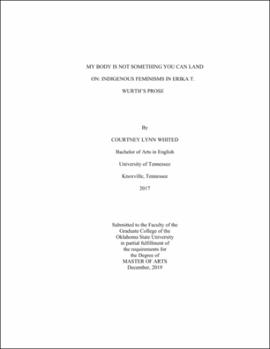| dc.contributor.advisor | Smith, Lindsey C. | |
| dc.contributor.author | Whited, Courtney Lynn | |
| dc.date.accessioned | 2020-08-24T16:47:27Z | |
| dc.date.available | 2020-08-24T16:47:27Z | |
| dc.date.issued | 2019-12 | |
| dc.identifier.uri | https://hdl.handle.net/11244/325413 | |
| dc.description.abstract | In their book Introduction to Feminist Thought and Action, Menoukha Robin Case and Allison V. Craig define Indigenous Feminism as centered around "cultural preservation and Indigenous sovereignty" (61). Specifically, Case and Craig explain, "Indigenous Feminism is about fighting the ongoing effects of colonization" (61). The following thesis looks at two of Erika T. Wurth's texts (Buckskin Cocaine and You Who Enter Here) as representations of how Indigenous Feminisms are depicted in and enacted through literature. Both Buckskin Cocaine and You Who Enter Here tell stories about what it means to be an Indigenous person" or, more specifically, Indigenous woman, in the settler-colonial society that exists in the United States and has been internalized within Native communities. As such, the following thesis explores what is to be gained from telling stories that simultaneously refuse to ignore the internalized heteropatriarchy in these spaces and address the paths forward to (re)Indigenizing these spaces. In the first chapter I provide a combination of a literature review focusing on Indigenous Feminisms and an analysis of the characters of Candy Francois and Lucy Bigboca in Buckskin Cocaine. I focus in on representation and the complicated politics of representation and performance. In the second chapter I focus on You Who Enter Here, looking primarily at the characters of Maria, Matthew, and Chris to talk about the effects of internalized heteropatriarchal models on young Native communities. I explore how the gang life genre is (re)conceptualized through Wurth's understanding of what current possibilities are provided for Native youths in general. Overall, my thesis hopes to serve as an entryway into my own thinking about how Indigenous Feminisms are presented in literary texts. | |
| dc.format | application/pdf | |
| dc.language | en_US | |
| dc.rights | Copyright is held by the author who has granted the Oklahoma State University Library the non-exclusive right to share this material in its institutional repository. Contact Digital Library Services at lib-dls@okstate.edu or 405-744-9161 for the permission policy on the use, reproduction or distribution of this material. | |
| dc.title | My body is not something you can land on: Indigenous Feminisms in Erika T. Wurth's prose | |
| dc.contributor.committeeMember | Miller, Douglas | |
| dc.contributor.committeeMember | Sicari, Anna | |
| dc.contributor.committeeMember | Hallemeier, Katherine | |
| osu.filename | Whited_okstate_0664M_16528.pdf | |
| osu.accesstype | Open Access | |
| dc.type.genre | Thesis | |
| dc.type.material | Text | |
| dc.subject.keywords | erika t. wurth | |
| dc.subject.keywords | indigenous feminisms | |
| dc.subject.keywords | literature | |
| dc.subject.keywords | native american studies | |
| thesis.degree.discipline | English | |
| thesis.degree.grantor | Oklahoma State University | |
